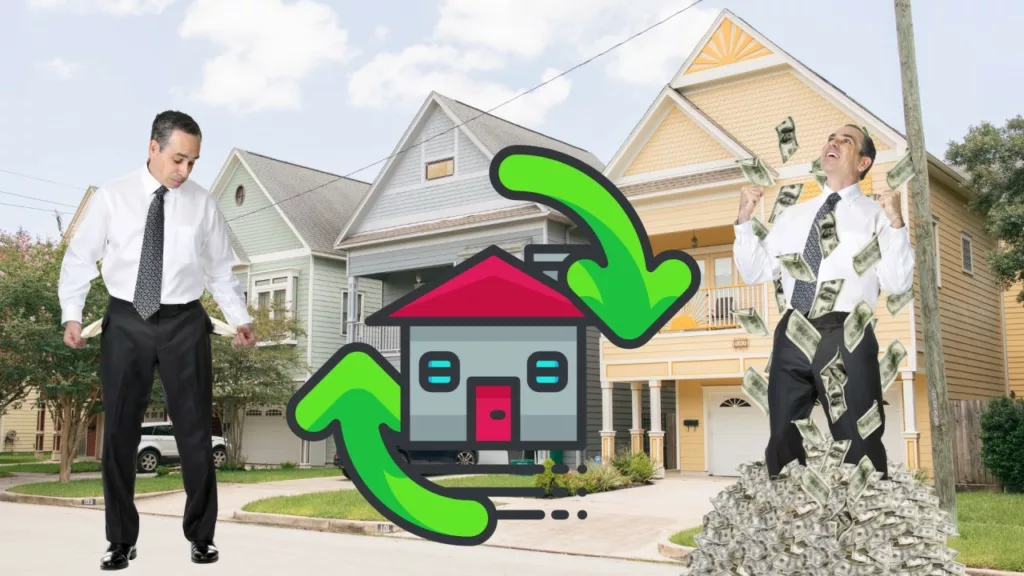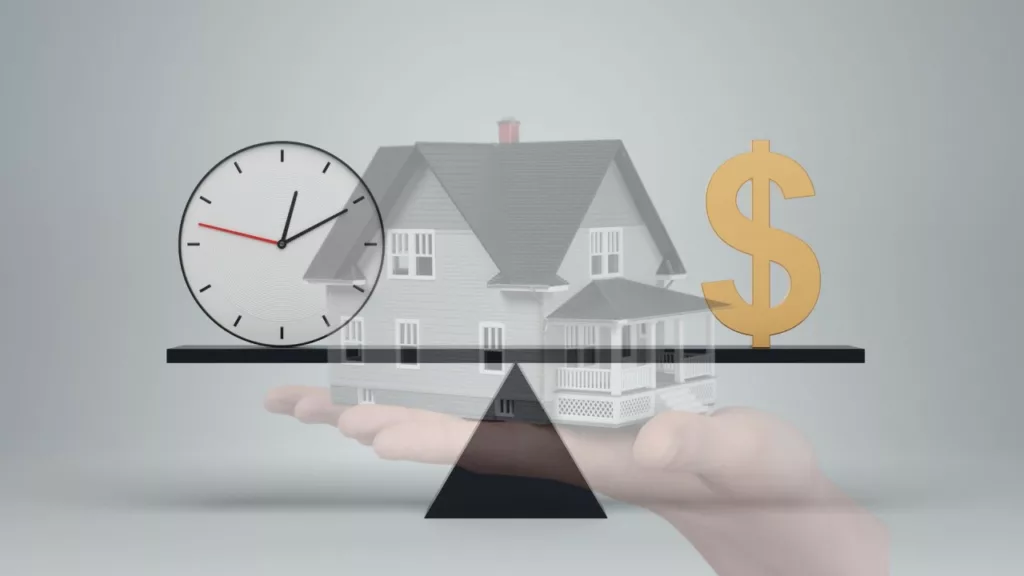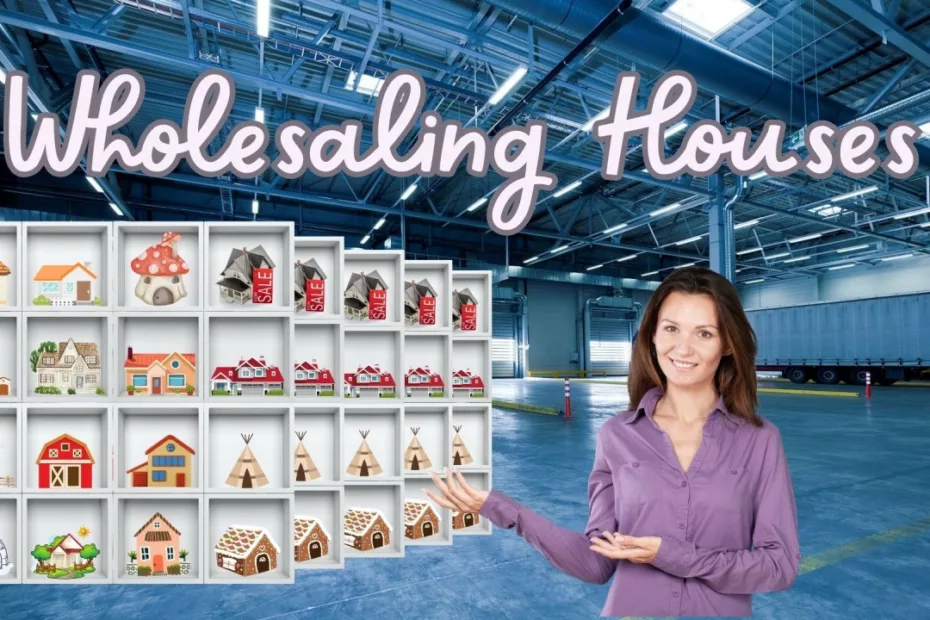I’ve been investing in real estate for more than 16 years. Over that time, I have built a rental portfolio with more than 70 houses. I have sold house wholesalers and entertained many deals for wholesalers. Now I will show you how to start wholesaling real estate.
As an experienced investor with firsthand knowledge and lessons learned, I invite you to explore wholesaling with me. This article will delve into the fundamentals of wholesaling, its benefits, the types of properties wholesalers seek, and practical strategies to find motivated sellers and eager buyers. We will navigate the nuances of this exciting investment avenue, empowering you to make informed decisions and embark on your real estate journey with confidence.
What is Wholesaling Real Estate?

Wholesaling is a business strategy that involves getting a contract to purchase a property and selling the contract to the ultimate buyer.
Wholesaling real estate allows individuals to profit from the world of real estate without the need for extensive capital or ownership of properties. In essence, it serves as a bridge between motivated sellers and potential buyers. This is a popular avenue for experienced real estate professionals and new investors looking to enter the industry.
At its core, wholesaling involves acting as the middleman, connecting property owners willing to sell at a discounted price with end buyers seeking good deals. Unlike traditional real estate transactions where a real estate agent represents a buyer or seller, a wholesaler operates independently. They leverage their knowledge of the local market and their network of contacts to facilitate profitable deals.
The wholesaling process begins with identifying distressed properties or off-market opportunities that can be purchased at significantly lower than the market value. Motivated sellers facing financial difficulties or looking for a quick cash sale present opportunities for wholesalers to negotiate favorable deals.
One of the first steps to start wholesaling real estate is to conduct due diligence, thoroughly researching the property, local market conditions, and comparable sales. This ensures that the potential deal is viable and aligns with the objective of securing a higher price when selling to the end buyer.
Once a wholesaler identifies a promising property, they enter into a purchase contract with the seller, which grants them the right to market and sell the contract to potential buyers. It is important to note that a real estate license is not typically required for wholesaling.
To effectively market the property, wholesalers employ various strategies. These include using social media platforms, implementing direct mail campaigns, and leveraging their network of contacts to reach potential investors or cash buyers actively seeking real estate deals.
When an interested buyer is found, the wholesaler enters into an assignment contract, wherein the rights to purchase the property are transferred to the end buyer. This agreement includes an assignment fee, which is the profit earned by the wholesaler for facilitating the transaction. Using real estate attornies or title companies helps ensure a smooth and legally compliant transfer of property ownership during the closing process.
Wholesaling real estate presents an excellent way to generate quick profits with relatively little money and minimal risk. It provides an opportunity to enter the real estate industry without substantial capital investment or the need to hold properties long-term. Successful wholesalers often develop a business model that allows them to repeat the process, establishing a consistent income stream and building their reputation in the market.
What Kind of Properties Do Wholesalers Look For?

You can’t start wholesaling real estate until you have a property to market. Wholesalers are constantly looking for specific properties that align with their business model and offer potential for profitable deals.
Off Market Deals
Off-market properties refer to properties that are not listed on the traditional real estate marketplaces or multiple listing services (MLS). These properties may not be actively advertised for sale, making them less visible to the general public. Wholesalers often prioritize off-market deals because they present opportunities to negotiate favorable terms and secure properties at discounted prices.
Motivated Sellers
Motivated sellers play a crucial role in wholesaling real estate. A motivated seller is an individual who has a strong desire or compelling reason to sell their property quickly.
A motivated seller is essential to wholesaling because their willingness to sell at a discounted price allows wholesalers to negotiate favorable terms and secure properties with profit potential. Wholesalers can help motivated sellers by offering quick and hassle-free transactions, cash purchases, and the ability to resolve any property-related challenges.
Below are some reasons a seller may be motivated to sell below market value.
- Financial Distress: Sellers facing financial difficulties, such as job loss, divorce, or overwhelming debts, may need to sell their properties urgently to alleviate financial burdens.
- Relocation or Life Changes: Homeowners relocating for job purposes, downsizing due to lifestyle changes, or going through significant life events may be motivated to sell their properties promptly.
- Property Issues or Challenges: Properties with structural issues, extensive repairs, code violations, or problematic tenants can cause owners to seek a quick sale rather than deal with the associated complexities and costs.
How to Find Properties to Wholesale
Finding properties to wholesale is a fundamental aspect of real estate wholesaling. It requires a proactive approach and the utilization of various strategies to uncover potential opportunities. By employing the following techniques, start wholesaling real estate now.
Driving for Dollars
An age-old tactic experienced real estate wholesalers employ is driving around specific neighborhoods and identifying distressed properties with the potential for selling at a discounted price. This hands-on approach allows you to assess the condition of properties and identify motivated sellers directly.
Online Research and Listings:
Conduct thorough research on real estate websites and platforms to search for on-market and off-market property listings. Websites such as HouseCashin Wholesale Property Marketplace, Zillow, Redfin, and Trulia can provide valuable leads. Look for properties with potential for wholesale deals, including distressed properties, properties listed below market value, or those needing renovation.
Networking and Relationship Building
Establish connections with real estate professionals, including agents, brokers, and investors specializing in the local market. Attend networking events, join real estate investment clubs, and participate in online forums and social media groups. Building relationships with industry experts can lead to potential wholesale opportunities through referrals or direct deals.
Robocalls
Robocalls use automated calling systems to deliver pre-recorded messages to many phone numbers. Wholesalers can use robocalls to reach out to homeowners and identify potential sellers interested in selling their properties at a discount.
Bandit Signs
Consider strategically placing bandit signs in high-traffic areas to attract motivated sellers. Bandit signs, also known as “we buy houses,” signs are often bright and eye-catching, featuring a simple message such as “We Buy Houses” or “Sell Your House Fast” along with contact information such as a phone number or website.
Direct Mail
You can implement direct-mail targeted marketing campaigns to reach potential sellers directly. This is where you send postcards or letters to property owners expressing your interest in purchasing their properties.
Online Presence and Advertising
Establish a solid online presence through social media platforms and websites. Create profiles or pages dedicated to your real estate wholesaling business, providing information about the properties you want to purchase. Utilize online advertising, such as running targeted ads on social media, to reach a broader audience of potential sellers.
How to Find Buyers

When investors start wholesaling real estate, it may seem challenging to find a buyer. However, finding a buyer is easy if you have a great deal.
Numerous real estate investors are looking for great deals; you just have to let them know about it. A solid buyers list ensures you can quickly assign contracts and complete successful wholesale transactions.
Remember to maintain professionalism, provide accurate information about your wholesale properties, and respond promptly to inquiries from potential buyers. By actively seeking out and building relationships with potential buyers, you enhance your ability to assign contracts quickly and efficiently, resulting in successful wholesale transactions.
Here are some effective strategies to find buyers for your wholesale deals:
Leverage Online Platforms
Online platforms are the best way to find buyers and start wholesaling real estate. Utilize them to expand your reach and connect with potential buyers. Explore real estate investor forums and online marketplaces specific to wholesaling, where investors actively seek opportunities. Social media platforms like Facebook, LinkedIn, and Instagram can also serve as effective channels to showcase your wholesale deals and engage with potential buyers.
Network with Real Estate Professionals
Establishing relationships with real estate professionals can be a valuable resource for finding buyers. Connect with real estate agents, brokers, property managers, and other investors in your local market. Attend real estate networking events, join real estate investment associations, and engage in online forums or social media groups focused on real estate investing.
Partner with Local Real Estate Agents
Collaborating with real estate agents specializing in investment properties can provide access to a pool of potential buyers. Real estate agents often work with investors seeking opportunities and can help connect you with qualified buyers. Offer to share your wholesale deals with agents who have a track record of working with investors and establish mutually beneficial relationships where you provide them with off-market opportunities.
Advertise Your Wholesale Deals
Implement targeted marketing campaigns to promote your wholesale deals to potential buyers. Use direct mail, bandit signs, and online advertisements to generate interest. Craft compelling property descriptions and highlight the possible profit margins for buyers.
Attend Real Estate Auctions
Real estate auctions can be valuable for finding buyers interested in investment properties. Attend local auctions where investors are present, engage in conversations, and distribute your business cards or promotional materials. Auction attendees are often experienced investors looking for new opportunities and may be interested in your wholesale deals.
Working with Buyers
A real estate wholesaler needs to bring a good deal to buyers. The investor that buys from a wholesaler is looking for great deals and is willing to pay the wholesale fee to get them. However, they will stop working with wholesalers when they are constantly present with mediocre deals.
Working with House Flippers
House flippers buy distressed properties, renovate them, and sell the retail to homeowners. House-flipping real estate investors need a source of good deals and will often turn to a wholesaler. Read this article to find what house flippers are looking for, then bring them deals that fit.
Working with Buy and Hold Investors
Buy and hold investors’ own rental houses for the long term. As a result, they need a good deal to have cash-flowing properties. Any wholesaler working with rental property owners should know exactly how much an investor should pay for a rental house.
Difference Between Wholesaling and Flipping
While wholesaling and flipping share similarities, it’s crucial to understand the critical differences between these methods before you start wholesaling real estate. This section will delve into the distinctions between wholesaling and flipping, shedding light on their unique characteristics, potential benefits, and the next steps involved in each process.
Wholesaling is a great way to enter the real estate market with limited capital. It involves securing properties at a discounted price and assigning or selling the contract to another buyer for a wholesale fee. As a successful wholesaler, one doesn’t necessarily need to use their own money or take ownership of the property.
On the other hand, house flipping revolves around purchasing discounted properties, typically distressed or needing repairs, intending to renovate and resell them for a profit. Flipping properties can be good for investors with access to capital and the necessary skills or team members to handle the renovation process.
Money and Time

One of the critical distinctions between wholesaling and flipping lies in the amount of money and time invested in the process. Wholesaling deals generally require less money upfront as wholesalers aim to secure properties with a minimal cash investment. Wholesalers earn a fee without actually purchasing the property.
On the other hand, flipping often necessitates significant money for property acquisition, renovations, and carrying costs such as utilities, taxes, and insurance during the renovation period. Additionally, flipping properties requires a substantial time commitment to oversee the renovation, manage contractors, and prepare the property for sale.
Hassle
Another notable difference is the level of involvement in the real estate business. Wholesaling allows investors to focus primarily on the marketing and negotiation aspects of the wholesale real estate transaction. In contrast, flipping requires hands-on involvement in the renovation process, managing contractors, and overseeing the complete property transformation.
Which is Better?
While wholesaling and flipping differ in their approaches, they share the goal of profiting from discounted properties in the real estate market. Each method requires hard work, market knowledge, negotiation skills, and effective marketing strategies.
Neither is superior. A greater profit comes from flipping houses, but the required time and money commitment offset this. Each fits into your investing arsenal to be used as needed. Whether you pursue wholesaling or flipping as your first real estate investment strategy, it’s essential to understand the nuances of each approach and tailor your efforts accordingly.
Types of Closing

Two standard methods to facilitate transactions when wholesaling real estate are double closing and assignment. While both approaches transfer the rights to a property from the wholesaler to the end buyer, there are distinct differences between the two techniques. When you start wholesaling real estate, understanding these differences is essential to choose the most suitable method for your specific circumstances.
Double Closing
A double closing, or a simultaneous closing, involves two separate and distinct transactions. In this method, the wholesaler enters into a purchase agreement with the property owner, securing the property under contract.
Subsequently, the wholesaler enters into a second purchase agreement with the end buyer. The goal is to coordinate the closings so that the wholesaler purchases the property from the seller and immediately sells it to the end buyer without taking ownership.
The double closing process typically involves using a title company or real estate attorney who handles both closings’ legal aspects and financial transactions. During the first closing, the wholesaler uses the end buyer’s funds to complete the property purchase from the seller. Then, in the second closing, the wholesaler transfers ownership to the end buyer, typically earning a wholesale fee.
The advantage of a double closing is that it allows wholesalers to keep the transaction confidential and avoid disclosing the purchase price to the end buyer. This can be advantageous when the wholesaler negotiates a significantly lower purchase price than the ultimate selling price, maximizing their potential profit.
It’s important to note that double closings may involve higher closing costs due to the involvement of two separate transactions.
Assignment
An assignment involves wholesalers assigning their contractual rights and obligations to the end buyer. Instead of going through the process of purchasing the property themselves, the wholesaler assigns the purchase contract to the buyer. This means that the end buyer steps into the shoes of the wholesaler, assuming all the terms and conditions of the original agreement.
With an assignment, the wholesaler typically negotiates an assignment fee with the end buyer, which is the profit they earn from the transaction. The assignment fee is often disclosed to the end buyer, as they know the original purchase price specified in the contract. The assignment process can be relatively straightforward, with the wholesaler providing written notice to both the seller and the buyer about the assignment and obtaining their consent.
Assignments are often favored by wholesalers who want to avoid the costs and complexities associated with double closings. By assigning the contract, the wholesaler can profit from the transaction without bringing their funds to the closing table or handling the legal intricacies of a double closing.
Wholesalers must ensure that their original purchase agreement allows for assignment, as some contracts may include specific provisions prohibiting or restricting an assignment.
Double Closing vs. Assignment: Distinction
The main distinction between a double closing and an assignment in real estate wholesaling lies in transferring property rights. Double closing involves two separate closings, allowing the wholesaler to purchase the property from the seller and immediately sell it to the end buyer. On the other hand, the assignment involves the wholesaler assigning their contractual rights to the end buyer without taking ownership of the property.
Both methods have advantages and considerations, and wholesalers should choose the approach that aligns with their specific circumstances and goals in a given transaction.
Ethics When Wholesaling

Wholesaling real estate, while a legitimate investment strategy, carries ethical considerations that wholesalers should carefully navigate. Many investors who start wholesaling real estate do it in an unethical manner; don’t let that be you. Maintaining ethical practices preserves the wholesaler’s reputation and ensures fairness and transparency in the transactions.
By adhering to these ethical guidelines, wholesalers can build a positive reputation within the industry and establish long-lasting relationships with sellers, buyers, and other real estate professionals. Ethical wholesaling practices contribute to a fair and transparent real estate market, benefiting all parties involved.
Honesty with Sellers
Wholesalers must refrain from misleading the property owner into believing that they are the actual buyers of the property. Communicating the wholesaler’s role as a contract assignor or facilitator is essential.
Misleading the seller can lead to problems down the line. If the seller feels deceived or discovers the true nature of the transaction during the process, it can create difficulties when showing the property to potential buyers and even result in a contentious closing. Maintaining honesty and transparency with the seller helps establish trust and fosters smoother transactions.
Assess Property Value ACCURATELY
Wholesalers should provide an accurate After Repair Value (ARV) to potential buyers and avoid inflating the ARV without substantial justification. If the wholesaler believes that the ARV differs from online sources, they should explain the reasoning behind their assessment. Transparency in determining the property’s value ensures that buyers make informed decisions.
Don’t Cherry-Pick Comparable Sales:
Wholesalers should avoid cherry-picking only the highest comparable sales when presenting the ARV to buyers. They should provide a comprehensive and balanced view of similar properties, accurately reflecting the market conditions. This approach helps buyers objectively assess the property’s value and make informed decisions.
Be Transparent With Renovation Cost Estimates
Wholesalers should avoid minimizing the renovation cost when discussing the property with potential buyers. If the wholesaler is uncertain about the renovation expenses, omit those numbers from the conversation. Providing accurate information regarding the property’s condition and the scope of necessary repairs promotes fairness and transparency in the transaction.
Bring Value to Buyers
Wholesalers should thoroughly understand what constitutes a good deal in the local market. By using high perplexity, wholesalers should carefully analyze potential properties and only present deals that offer value to buyers. This includes considering the property’s condition, ARV, renovation costs, and potential profitability. Wholesalers should ensure that the property remains a good deal for the buyer, even after adding their wholesale fee.
Conclusion
Wholesaling real estate involves securing properties at discounted prices and selling the contracts to end buyers. Wholesaling serves as a bridge between motivated sellers and buyers seeking good deals, providing an avenue for both experienced professionals and new investors to profit from real estate without extensive capital or property ownership.
Wholesalers identify distressed or off-market properties with profit potential, conduct due diligence, and enter into purchase contracts with sellers. They employ various marketing strategies to reach potential investors or cash buyers, leveraging social media, direct mail campaigns, and networking. Wholesalers can choose between double closing and assignment methods to transfer property rights when an interested buyer is found.
Ethics are essential when wholesaling real estate. A good wholesaler will be honest and transparent with sellers and provide an accurate property assessment to buyers. Ethical practices ensure fairness, build trust, and contribute to a positive reputation within the real estate industry.
Wholesaling real estate offers a pathway to quick profits and entry into the industry. By combining ethical practices with market knowledge, negotiation skills, and effective marketing strategies, wholesalers can establish a successful presence in the market.
Find your first house, and start wholesaling real estate today!




